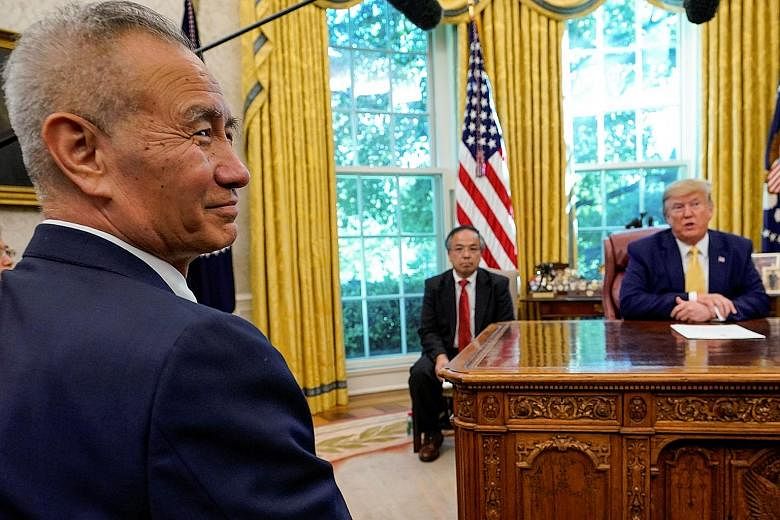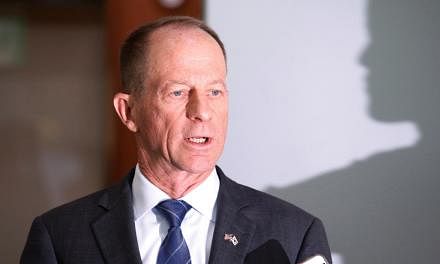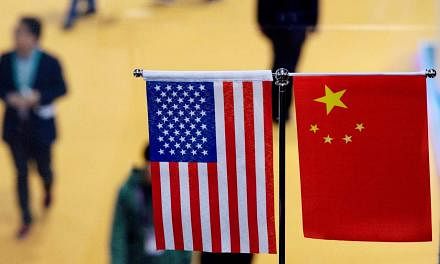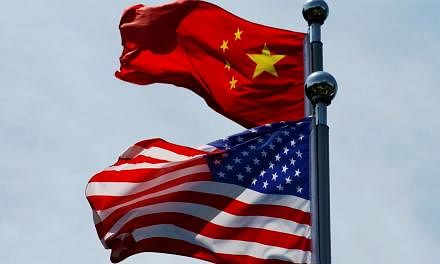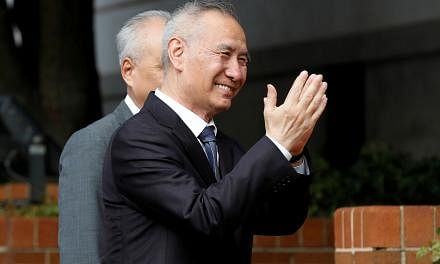China and the US have reached "phase one" of a trade agreement that helped soothe market nerves as President Donald Trump shelved an impending tariff hike, but both sides acknowledge there is still substantial work to be done before a deal can be reached.
Negotiators shook hands on China's import of US farm goods to the tune of US$40 billion (S$55 billion) to US$50 billion a year, doubling the amount in 2017 before the trade war erupted.
In return, Mr Trump halted plans to raise tariffs from 25 per cent to 30 per cent this week on US$250 billion worth of Chinese products.
Speaking to reporters in his Oval Office with Chinese Vice-Premier Liu He on Friday, Mr Trump said an accord could take four to five weeks to be drafted and could be signed next month. "There was a lot of friction between the United States and China, and now it's a love fest. That's a good thing," he told reporters.
But China's response to the two-day talks that just concluded in Washington was more circumspect, with no mention of an agreement.
"We have made substantial progress in many fields. We are happy about it. We'll continue to make effort," said Mr Liu.
The initial deal covers agriculture, intellectual property rights protection, exchange rate and financial services. Technology transfer and dispute settlement were also discussed.
Talks collapsed in May after both sides seemed to have made steady progress to end the drawn-out trade war that began early last year.
"I think we have a fundamental understanding on the key issues. We've gone through a significant amount of paper, but there is more work to do," US Treasury Secretary Steven Mnuchin said after the talks.
An editorial in China's official news agency, Xinhua, described the progress made as "rational and pragmatic".
"However, many of the issues that follow are still full of uncertainty."
Another editorial, in the nationalistic Global Times, took a similarly cautionary tone. "Ending the trade war means removing all imposed tariffs, which is a prerequisite... Eliminating a part of tariffs only signifies mitigated tensions, rather than an end of the trade war."
US stocks ended more than 1 per cent higher yesterday on news of the partial deal, while the US Chamber of Commerce was quick to describe it as "a ray of hope for the US-China trade relationship".
"President Trump's announcement to postpone the tariff hike is welcome news for American businesses, farmers and consumers, and we are optimistic that this move paves the way towards a comprehensive, high-standard and enforceable deal with China," said Mr Myron Brilliant, the chamber's executive vice-president in a statement.
Analysts say what was achieved at the latest round of talks can only be seen as a truce.
"At the moment, Trump needs economic peace with Beijing and stable financial markets through the 2020 election cycle and during impeachment proceedings, and this deal is his best chance to secure such a goal," said Mr Harry Kazianis, senior director at American think-tank, Center for the National Interest.
"And with China's economy struggling under the pressure of ever-increasing tariffs, this agreement came together based on both sides' mutual short-term interests."
Sino-US relations academic Shen Dingli said the progress reached on Friday could have come earlier if the US was willing to take a phased approach sooner. It also conceded to China's proposal to keep most of the details of the talks under wraps, something it was not willing to do in earlier rounds of negotiations. "But the trade war is still far from over... It's just a temporary reprieve," said the Shanghai-based professor.
• Additional reporting by Nirmal Ghosh
